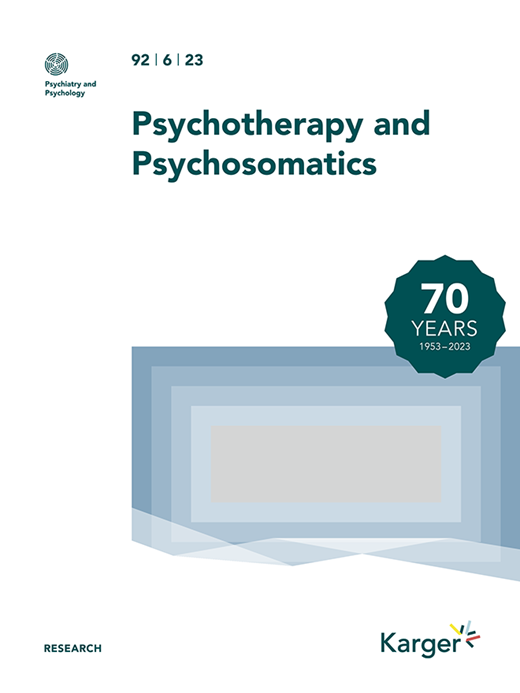Efficacy of team‑based collaborative care for distressed patients in secondary prevention of chronic coronary heart disease: Results from the multicenter, randomized controlled TEACH trial.
IF 17.4
1区 医学
Q1 PSYCHIATRY
引用次数: 0
Abstract
INTRODUCTION Coronary heart disease (CHD) has serious implications for patients´ quality of life (QoL). Psychological distress affects 15 to 40% of patients with CHD and is robustly associated with poorer prognosis. Blended collaborative care (BCC), a telephone-delivered intervention involving non-physician care managers that address both psychological and medical factors can be applied for secondary prevention of CHD. METHODS We conducted the multicenter, randomized controlled TEACH trial that investigated the efficacy of a BCC intervention (TeamCare) in distressed CHD patients. The primary aim was to examine the treatment response rate of TeamCare defined as ≥ 50% improvements in health-related QoL (HRQoL, assessed by HeartQoL) after 12 months compared to usual care (UC). Secondary endpoints were changes in HRQoL, psychological and medical factors, and satisfaction with care. RESULTS In total, 457 patients (mean age 62.9 ± 9.5 years, 23% females) were randomized to TeamCare (n=230) or UC (n=227). At 12 months, TeamCare patients showed a significantly higher proportion of treatment response on HeartQoL compared to UC (19% vs. 10%, respectively). TeamCare yielded significantly greater improvements in HeartQoL scores: global (d=0.338), physical (d=0.270), and emotional (d=0.382). Further, TeamCare led to a significantly greater decrease in depression (d=-0.329), anxiety (d=-0.300), perceived stress (d=-0.233), and medical risk score (d=-0.235). Finally, BCC patients showed a higher satisfaction with overall treatment and psychosocial care. CONCLUSION The TEACH study is the first ever performed BCC trial in distressed CHD patients in Europe. The BCC intervention has the potential to significantly improve secondary prevention in distressed CHD patients.以团队为基础的协同护理对慢性冠心病患者二级预防的疗效:来自多中心、随机对照TEACH试验的结果
冠心病(CHD)严重影响患者的生活质量(QoL)。心理困扰影响15% - 40%的冠心病患者,并与较差的预后密切相关。混合协同护理(BCC)是一种涉及非医生护理管理人员的电话干预,可以解决心理和医学因素,可用于冠心病的二级预防。方法我们进行了多中心、随机对照的TEACH试验,研究了BCC干预(TeamCare)对危重冠心病患者的疗效。主要目的是检查TeamCare的治疗反应率,定义为12个月后与常规护理(UC)相比,健康相关生活质量(HRQoL,由HeartQoL评估)改善≥50%。次要终点是HRQoL的变化、心理和医学因素以及对护理的满意度。结果457例患者(平均年龄62.9±9.5岁,女性23%)随机分为TeamCare组(n=230)和UC组(n=227)。在12个月时,与UC相比,TeamCare患者在心脏质量方面的治疗反应比例明显更高(分别为19%和10%)。TeamCare在HeartQoL评分方面取得了显著的改善:整体(d=0.338)、身体(d=0.270)和情绪(d=0.382)。此外,TeamCare导致抑郁(d=-0.329)、焦虑(d=-0.300)、感知压力(d=-0.233)和医疗风险评分(d=-0.235)的显著下降。最后,BCC患者对整体治疗和心理社会护理表现出更高的满意度。TEACH研究是欧洲首个在危重期冠心病患者中进行的BCC试验。BCC干预有可能显著改善危重冠心病患者的二级预防。
本文章由计算机程序翻译,如有差异,请以英文原文为准。
求助全文
约1分钟内获得全文
求助全文
来源期刊

Psychotherapy and Psychosomatics
医学-精神病学
CiteScore
29.40
自引率
6.10%
发文量
46
期刊介绍:
Psychotherapy and Psychosomatics is a reputable journal that has been published since 1953. Over the years, it has gained recognition for its independence, originality, and methodological rigor. The journal has been at the forefront of research in psychosomatic medicine, psychotherapy research, and psychopharmacology, and has contributed to the development of new lines of research in these areas. It is now ranked among the world's most cited journals in the field.
As the official journal of the International College of Psychosomatic Medicine and the World Federation for Psychotherapy, Psychotherapy and Psychosomatics serves as a platform for discussing current and controversial issues and showcasing innovations in assessment and treatment. It offers a unique forum for cutting-edge thinking at the intersection of medical and behavioral sciences, catering to both practicing clinicians and researchers.
The journal is indexed in various databases and platforms such as PubMed, MEDLINE, Web of Science, Science Citation Index, Social Sciences Citation Index, Science Citation Index Expanded, BIOSIS Previews, Google Scholar, Academic Search, and Health Research Premium Collection, among others.
 求助内容:
求助内容: 应助结果提醒方式:
应助结果提醒方式:


